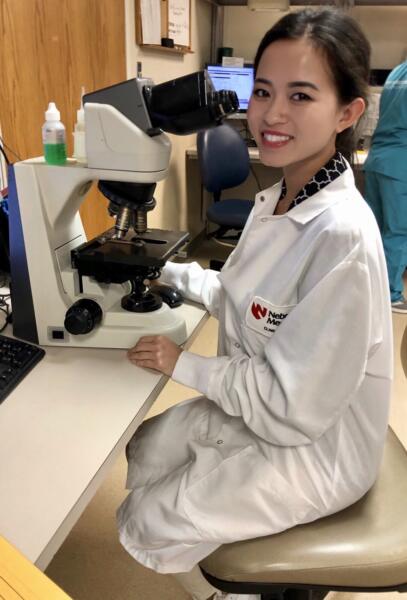Thanh Nguyen, MLS(ASCP)CM
As I researched career opportunities for medical laboratory scientists (MLSs) back in 2016, I found a very disturbing issue. My home state of Nebraska and nearby Iowa were not states with personnel licensure requirements for laboratory professionals. One mistake in the laboratory testing can result in so much damage. It caused me to wonder how accurate my laboratory results were at the hospital that I’ve been going to since I was a little girl. I also worried about the care my family had received.
 |
| Author Thanh Nguyen recently graduated from the medical laboratory science program at the University of Nebraska Medical Center. She is now a medical laboratory scientist at Nebraska Medicine. |
If I had never done any research on MLS, I would not have known that there is a difference between licensure and certification. According to ASCLS, licensure is a process in which a state governmental agency gives permission to any individual to work in an occupation once this individual has met the required competency to ensure public health, welfare, and safety. This means, it is unlawful to practice without a license.
ASCLS defines certification as a status granted by a non-governmental agency that gives formal recognition to an individual who has met pre-determined education requirements and technical competencies. Having a certification is a voluntary process; hence, it is not required to obtain employment. In order to work, the state does not require certification, but certification is usually required to obtain a license. Out of the 50 states, only 11 states require a license to work as an MLS in that state.
There are many pros and cons to consider when it comes to deciding whether states should require licensure. Many medical decisions depend on laboratory results. As an MLS student, I know how important it is for those results to be produced in an accurate, yet timely manner. If the results are even slightly inaccurate, misdiagnosis can result in a life-threatening situation for patients.
The Pros for Licensure
By requiring licensure, physicians, nurses, and patients can be confident in the results we provide since doctors and other healthcare workers make decisions everyday based on the laboratory results we provide. Licensure not only protects the public by excluding individuals not properly educated from performing testing, but it also defines and protects the scope of practice of the MLS profession (ASCLS). Licensure by the state provides a safeguard for clinical laboratories by excluding individuals who are not properly educated from performing complex testing. ASCLS states that laboratory personnel licensure is essential to protect patients from misleading results. Licensure assures the individuals performing laboratory testing are well educated and qualified. Both ASCP and ASCLS support laboratory personnel licensure to ensure high quality.
The Cons for Licensure
Those who are against personnel licensure argue there will be a decline in availability of laboratory professionals, especially in rural and underserved areas. They also feel there will be an increased cost to laboratory professionals to maintain their license, increased costs to the patient for laboratory testing, and increased costs to the state to implement and maintain licensure.
Other than a minor cost for maintaining a license, these claims have not been proven true in states that currently require personnel licensure. According to ASCLS, there was no direct correlation between implementation of laboratory personnel licensure and increased levels of compensation. It also states, “Quality lab testing performed by appropriate educated clinical laboratory professionals should result in more cost-effective health care for the American public.”
While it is true that there currently is a shortage in the MLS workforce, ASCLS states this shortage is due primarily to the retirement of an aging workforce, an increase in demand for laboratory services, changes due to laboratory technology advances, and vacancy rates that exceed the number of MLS graduates.
Patients’ Health and Safety Come First
I believe that all 50 states should require a license for laboratory professionals to work because the patient’s safety comes first. No matter what testing is done, patients need to feel they are receiving the highest quality care. Laboratory workers are not often seen, so patients have no idea who is working on their specimens or how accurately these people can perform their testing. Patients probably think licensed individuals do their testing and might be concerned if they knew we were not all licensed like many other health professionals. I believe that even the slightest mistake can cause a problem that may go unnoticed. Perhaps these mistakes result in the physician having trouble making the proper diagnosis.
There are possible downsides to licensure; mostly relating to expenses, but when it comes to public health and safety, cost should not be the only consideration. A patient’s health and safety should be our number one concern, and to provide that, I think personnel licensure to practice as an MLS by all 50 states is needed.
Thanh Nguyen is a medical laboratory scientist at Nebraska Medicine. She recently graduated from medical laboratory science program at the University of Nebraska Medical Center.
